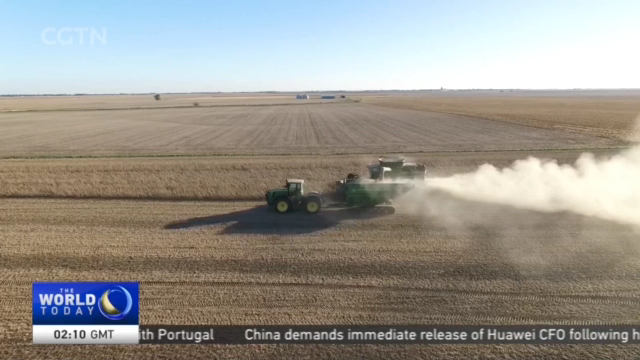
11:16, 06-Dec-2018
Global Climate Change: Agriculture in US Midwest states already impacted
Updated
11:03, 09-Dec-2018
03:21

A group of scientists say this year the world is set to see the biggest jump in carbon dioxide emission in the past few years. The announcement comes as UN climate talks continue in the Polish city of Katowice. Representatives from some 190 countries are gathered to discuss how to implement the 2015 Paris climate agreement. The United States, the world's second largest producer of greenhouse gas, is noticeably absent. US President Donald Trump says he does not believe there is such a thing as climate change. But as CGTN's Dan Williams reports, it has already taken its toll on US farmers.
From brutally freezing winters to boiling hot summer days. The U.S. state of Illinois must prepare for both weather extremes.
But the weather patterns for this region appear to be changing.
A recent scientific report issued by 13 federal agencies laid out the devastating effects climate change will have on the economy, health and the environment.
For the Midwest, a key agricultural region, the report predicts an increase in crop failures primarily because of extreme heat, drought and flooding.
Jim Angel is the Illinois state climatologist and one of the report's authors.
JIM ANGEL ILLINOIS STATE CLIMATOLOGIST "The key findings at least for the Midwest are the big impacts that we are seeing on agriculture already, and that we are going to see even more in the future. And those are big economic impacts. Obviously, any time you are messing with the food supply, not only of the U.S. but the world, that can have major impacts around the region."
For Midwest farmers, the higher temperatures would likely add further stress to soil erosion, plant disease and an increase in pests.
DAN WILLIAMS TOLONO, ILLINOIS "This farm in central Illinois enjoyed a bumper harvest this year. But there have already been signs over the last few years that climate change is beginning to have an impact."
Lin Warfel has farmed here for 56 years. Although he remains skeptical over the cause of climate change he has noticed the effects.
LIN WARFEL ILLINOIS FARMER "When it rains, it pours. So this land is really flat. Too flat. So when we get a three or four-inch rain, we have flooding. And none of our crops like to be under water. They can stand a little bit but not for very long and then the yield drops or they even die."
The report says improvements in technology and science have so far largely insulated farming from the effects of climate change. But for how long?
JIM ANGEL ILLINOIS STATE CLIMATOLOGIST "At some point, I think it is going to break down, and then I am very concerned. Cause if you look at the food supplies of America and the world, we don't carry over that much from one year to the next. So if we get in a drought year, the supplies are fairly tight. So if we have multiple bad years, that's when it gonna really be a large impact, not only in the U.S. but on the world markets."
There is still hope. Angel says making efforts to reduce greenhouse gases can still reduce the severity of the impact.
The question though is whether those efforts will be made. Dan Williams, CGTN, Tolono, Illinois.

SITEMAP
Copyright © 2018 CGTN. Beijing ICP prepared NO.16065310-3
Copyright © 2018 CGTN. Beijing ICP prepared NO.16065310-3